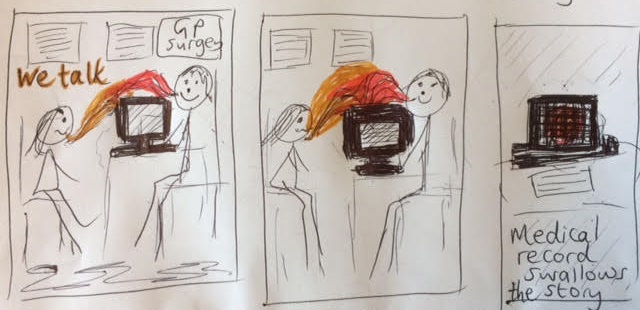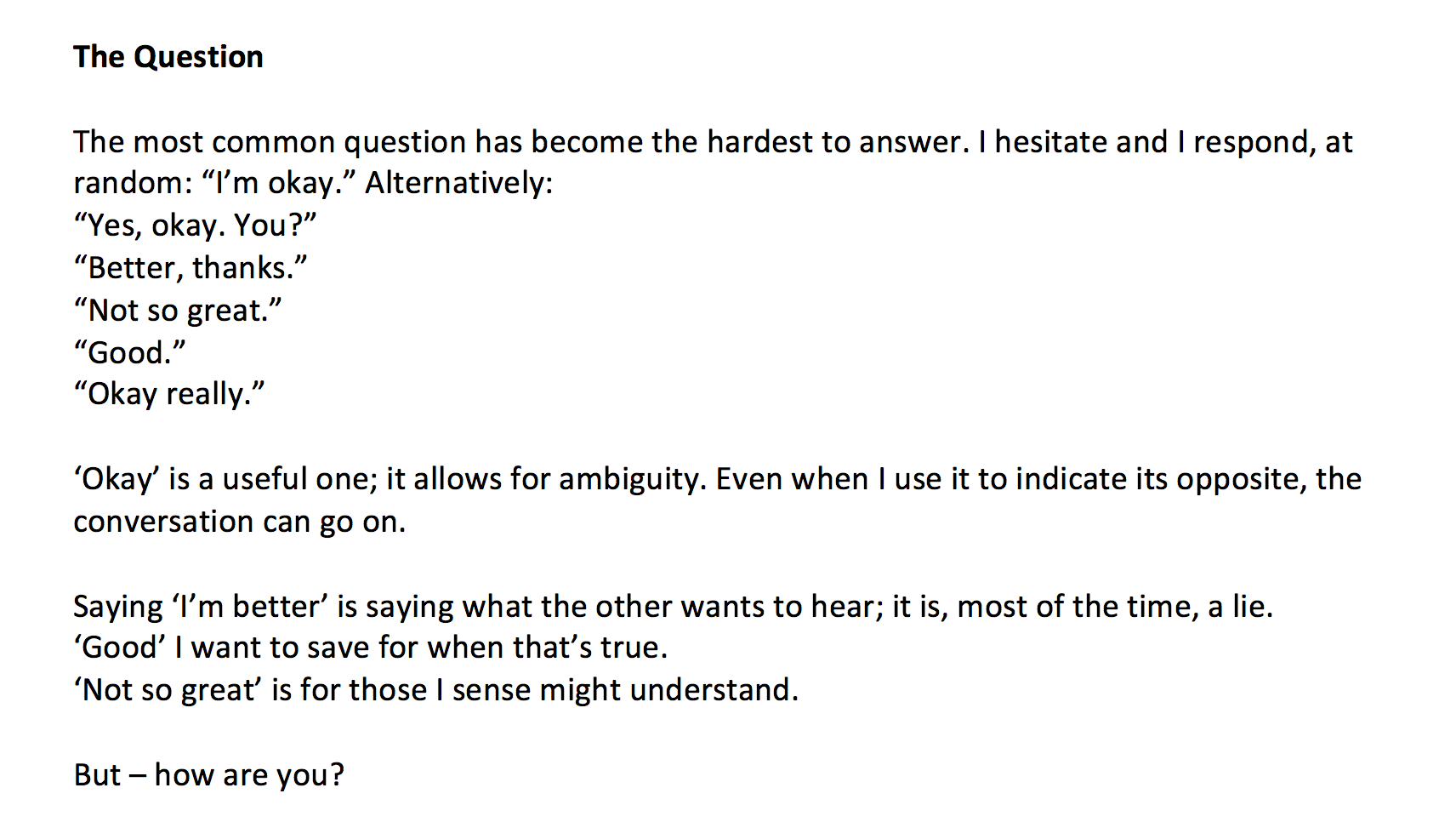
- by Sara Wasson
U.K.
'Flash' writing anthology about chronic pain - submissions welcome!

U.K.
The difference between lowercase-p, pain, and uppercase-P, Pain, is huge.
Bigger than just a shift-key should make it.
The difference between “Yeah, let’s go on a hike today!” and “I can’t walk today.”
The difference between pain that ends, and Pain that just backs off for a while.
The difference between the morning pills and the afternoon pills and the evening pills and the night pills and the pills and the pills and the injections and the appointments and the Pain.
The differences between the screaming in your head and the screaming locked in the gilded cage in your throat, and the knowledge that it is a bird that will never die, it will just remain in you, like a bird throwing itself against a window pane.Yes, pain and Pain are so completely different, I can’t believe they’re even spelled that same way.
United States
PAIN AND ITS KILLERS
relief
is
an
acceptable inevitable storm-head alarm
that holds back its rain
and mumbles thunder instead
a hard-sell of cotton ignorance
on the sofa that’s the world
MOON
the days hurt
and
the nights – well
they’re a VHS video-nasty
trembling on pause
I only hope
the
the
moon
knows
why I yell at him
FAR FAR AWAY
drugs argue
in my blood
and
bedside drawer
like married pensioners and their TV shows
I
just
wish
they could get along
far far away
without me
ITS THE WAY I TELL THEM
I told the Dr
that it all hurts SO much
and I’m SO tired SO much
and its SO very hard to THINK now
that it makes me want to CRY
but I CAN’T cry
I told the Dr
cos of all the antidepressants
and she barked involuntary laughter
and suggested I swim
hatchbacks on fire: author website
UK
Representing Pain: Fragments and Narrative
A symposium at Lancaster University
Friday 17 August 2018, 9:00 am -5.30 pm
I am delighted to announce a Symposium to be held at Lancaster University on Friday 17 August, exploring the challenges pain poses to traditional narrative representation, and the way it may require rethinking narrativity or embracing unconventional or fragmentary narrative forms.
The Symposium is part of the AHRC-funded research network Translating Chronic Pain, which is especially exercised by the way that conventional illness narrations (long form autobiography/memoir) don’t always lend themselves well to chronic pain experience. The symposium will explore the broad debates around narrativity in medical humanities, the potential of short-form narration or unconventional forms of illness narration, the positivity imperative in illness narration, challenges of chronic pain representation, and the way ‘entanglements’ with fields such as disability studies and trauma theory may enrich critical medical humanities approaches to these questions.
The network brings together academics, pain charities and people living with chronic pain, to explore how short-form creative writing may support people living with chronic pain, raise awareness, and enhance healthcare training. Among other things, the network is exploring ‘flash’ illness writing, and we have produced a web-based public anthology of creative work in this vein at the project website. The call for creative work remains open. (5-150 words) of prose, poetry, optionally alongside artwork or comic/sequential art. For details please see http://wp.lancs.ac.uk/translatingpain/creative-manifesto/ .
Confirmed symposium speakers include: Dr Angela Woods (Durham), Dr Stella Bolaki (Kent), Professor James Berger (Yale), Dr. Megan Crowley-Matoka (Northwestern), Professor Ann Jurecic (Rutgers), Professor Brendan Stone (Sheffield), Professor Alan Bleakley, and Professor Javier Moscoso (Research Professor of History and Philosophy of Science, Centro de Ciencias Humanas y Sociales, Spain).
Accommodation and partial travel bursaries are also available for six postgraduate students or early career researchers.
For more information please visit the project website at http://www.lancaster.ac.uk/translating-pain or email S.Wasson@lancaster.ac.uk.

Germany
I am in the centre of nothing.
Nothing cushions me.
Nothing protects me
I am comfortable surrounded by nothing
Nothing is nice and kind and gentle.
I am nobody in nothing
I am special in nothing
Nothing matters in nothing
Nothing is everything
I am nothing
Nothing touches me
I touch nothing
Nothing moves me
I move nothing
Nothing loves me
I love nothing
Nothing is good
Nothing is great
Nothing is better than me
UK
A rookery, long abandoned now,
had been built inside my body.
I don’t know where the birds went
or why, one day, they uninhabited,
leaving only their barbed-wire
residues, strung across the boughs
of my hips; all sticks and spit,
all hollows meant for holding
something small, still desperately
alive. I’m sorry – I’m afraid
I know only my own dark canopy,
its filtering bones of light.
UK
I flirt with my itch.
By turns it niggles, seduces, pesters;
as it gapes, festers,
I reach down,
don’t dare to look,
rip legs to shreds with nails, shorn short
(but not short enough);
viscous red
smeared across my calf,
warm to touch.
I suppurate for art;
as if sawed in half,
shriek a pain.
I climax;
vow to abstain
in future;
fail.
United Kingdom
The television I bought five years ago
sits in the corner of my room.
It helped me through those morphine nights
where my lung drain, like a sick umbilical cord
snagged from my side.
I would watch Countdown at 3 a.m., clasping
the puppetry of sign language like a charm.
UK
It wouldn’t be fair to say the ache starts
every morning as I wake.
Or truthfully that I wake at all,
more I become conscious… of the pain.
The fire started small and young.
Fickle flickering up my spine.
Across my shoulders like a seasoned log,
spreading further, faster as I age.
It took hold.
It ravaged me, left me weak and wincing.
Scared to stretch my body,
as if it would elongate my pain.
The ache doesn’t care how I adjust.
Turn this hip, rest this hand, lift this leg.
To chase it out of one limb just moves it,
across the map of my body.
It doesn’t listen to the pills.
Signals sent to block it in my brain.
It weaves its way round them,
conniving and wheedling itself into my synapses.
Author website: www.kittyfrilling.co.uk
United Kingdom
© 2026 Translating Chronic Pain: Moments and Fragments
Theme by Anders Noren — Up ↑